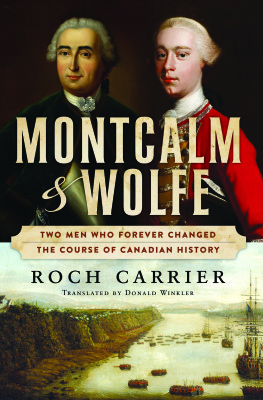There is no shortage of writing on the events surrounding the conquest of Canada by the British Empire during the Seven Years’ War. Roch Carrier’s Montcalm and Wolfe: Two Men Who Forever Changed the Course of Canadian History, originally published in French, is a recent contribution to the genre, focusing on the lives of the two military leaders whose armies clashed during the siege of Quebec City in 1759. The distinguished author’s name should ring a bell since Carrier was made famous by his short story “The Hockey Sweater,” which was quoted on an older version of our $5 bills. The word “Canadiana” fits Roch Carrier’s work like a glove.
Although his style of writing (and lack of citations) is suitable for a popular audience, Carrier ends up focusing heavily on the details of the campaigns led by Wolfe and Montcalm before and during the British conquest of New France. He gets right down to troop movements, exact numbers of dead and wounded, discarded attack plans, and so on. Such considerations would have loomed very large in Montcalm and Wolfe’s thoughts, and since the book is first and foremost a tightly spun, fast-paced biography of these two men, these minutiae figure prominently. Military history buffs will feel right at home among such details.

Montcalm and Wolfe
Two Men Who Forever Changed the Course of Canadian History
Roch Carrier
Translated by Donald Winkler
HarperCollins
$34.99
cloth
336pp
978-1-4434-3688-5
A word on the representation of Indigenous peoples: Carrier severely misses the mark on this front. One might expect to read statements such as “bands of natives would … smell the enemy’s presence on the wind” or “the natives … were unable to suppress their warrior instincts” in pulp fiction, not in a history book written in recent years. Indigenous peoples only feature in Carrier’s account insofar as they participate in one specific battle or another, and always in a peripheral manner – nothing is said about how they imagined their shifting alliances with the French or the English crowns. Indeed, the book’s closing statement that all of the belligerents described in the book had been “swept away by the raging currents of a war between narcissistic tribal chiefs,” in reference to the rulers of France and Britain, simply reminded this reader of the near absence of actual “tribal chiefs” in Carrier’s narrative.
The author’s explanation of his decision to write about Montcalm and Wolfe is deliciously ambiguous: he explains that he once travelled hundreds of kilometres on a scooter, all the way to Montcalm’s former residence in France, in order to pay his respects to the man who tried but failed to defeat the British army. “And I promised myself then,” he writes, “that one day I would try to understand why.” At first blush, Carrier is simply raising the central question of the conquest – how did France lose its North American territories to Britain? – to which he provides a thorough military analysis. On the other hand, perhaps the author is, unintentionally, raising another question for readers: Why do the lives of these military men – their battles and their personal struggles – matter so much to some of us all these years later? mRb






0 Comments